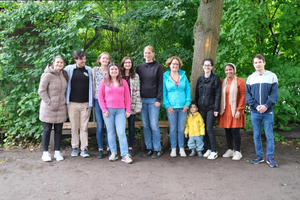Escape from X-inactivation in neurodevelopment
1 PhD project offered in the IPP summer call Molecular Biomedicine & Ageing
Scientific Background
Substantial differences between male and female have been observed in susceptibility of neurodevelopmental diseases. The second X-chromosome in female could play an important role in the molecular mechanisms underlying female resilience.
In comparison to males with one X and a Y-Chromosome, females with two X-chromosomes have a higher gene dosage. For dosage compensation one of the two X-chromosomes in female cells is randomly inactivated through epigenetic modification. However, several genes on the inactive X-chromosome escape inactivation and are expressed from both X-chromosomes. Such bi-allelic expression can lead to a substantial female expression bias and, through gene-gene interactions can significantly influence gene expression in female cells.
PhD Project: Implications of selective escape from X-inactivation in neurodevelopmental disorders
We hypothesize that such expression biases underly the sex differences in disease susceptibility during neurodevelopment. To strengthen this hypothesis, we are analysing bi-allelic expression of X-chromosomal genes in differentiating neurons and non-neuronal cells in the brain including astrocytes, microglia and immune cells that invade the developing brain. We are also looking at the mechanisms underlying tissue-dependent escape and are studying the effects of expression biases of selected genes on cell function and disease susceptibility. We are working in human iPSC generated models and in mice.
If you are interested in this project, please select Susann Schweiger (Xinact) as your group preference in the IPP application platform.
Publications relevant to this project
Käseberg S*, Bertin M*, Menon R*, Gabassi E*, Todorov H*, Frank S, Brennenstuhl H, Lohrer B, Winter J, Krummeich J, Winkler J, Winner B, Weis E, Hartwich D, Diederich S, Luck K, Gerber S, Lunt P, Berninger B, Falk S*, Schweiger S*, Karow M* (2023). Dynamic X-chromosomal reactivation enhances female brain resilience. bioRxiv. Link
Rücklé C, Körtel N, Basilicata MF, Busch A, Zhou Y, Hoch-Kraft P, Tretow K, Kielisch F, Bertin M, Pradhan M, Musheev M, Schweiger S, Niehrs C, Rausch O, Zarnack K, Keller Valsecchi CI, König J. (2023) RNA stability controlled by m6A methylation contributes to X-to-autosome dosage compensation in mammals. Nat Struct Mol Biol. Aug;30(8):1207-1215. Link
Patrat C, Quimette J-F, Rougeulle C. (2020) X chromosome inactivation in human development. Development 147(1):dev183095 Link
